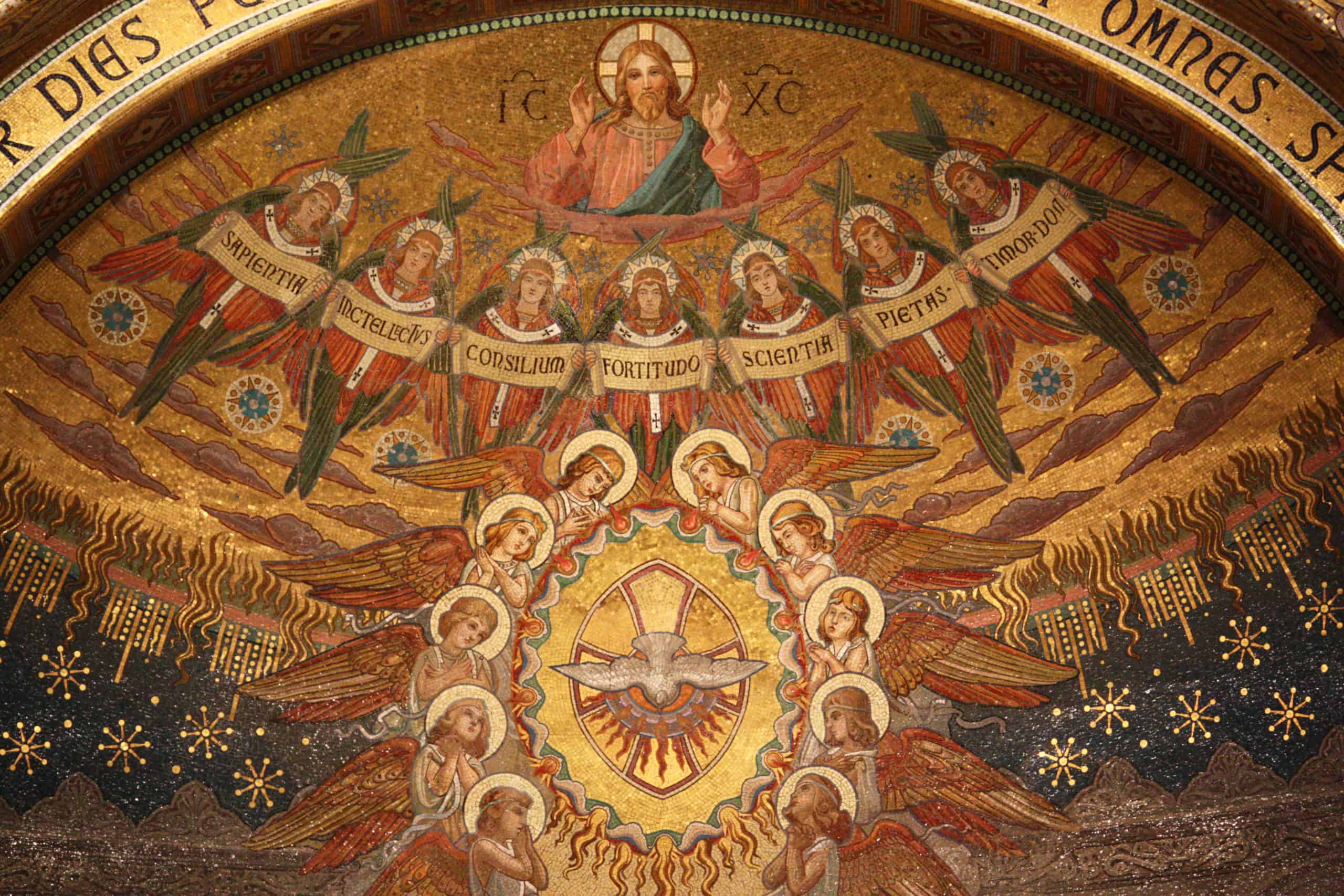If you received the sacrament of Confirmation as a teenager, you were most likely asked to memorize a list of the seven gifts of the Holy Spirit as part of your preparation. As Catholic Christians, we believe that the sacraments of Baptism and Confirmation indelibly mark us as belonging to Christ. The outpouring of the Holy Spirit in these sacraments also makes us more attuned to God’s voice in our lives, and it is through the seven gifts of the Holy Spirit that we are strengthened each day in becoming the person that God created each of us to be.
The gifts of the Holy Spirit are first mentioned in the Old Testament. The prophet Isaiah describes the ideal Davidic king with these words:
The spirit of the Lord shall rest upon him:
a spirit of wisdom and of understanding,
A spirit of counsel and of strength,
a spirit of knowledge and of fear of the Lord,
and his delight shall be the fear of the Lord. (Isaiah 11:2-3)
Our Christian faith teaches us that Jesus, the Son of God, expressed each of these attributes of the “spirit of the Lord” in their perfect fullness. Because of our participation in Christ, we, too, are given a share of each of these gifts of the Spirit. Jesus himself assured us of this when he promised that his Father would send the Holy Spirit upon us in his name, to teach us everything and remind us of all that he told us. (John 14:26) It is through these seven gifts–wisdom, understanding, counsel, knowledge, fortitude, piety, and fear of the Lord–that we grow in holiness and are continually reminded of God’s loving presence within us and around us.
It is easy to consider the gifts of the Holy Spirit only in the abstract, without deeply pondering the ways in which they are a part of our everyday lives because of God’s goodness and generosity towards us. In reality, these seven gifts have a variety of expressions that are unique to us as individuals.
In my own life, I have sometimes experienced fear of the Lord most deeply when looking up at the stars in the countryside on a clear summer’s night. I am reminded of God’s infinite power and majesty, and His care for the universe and all that is in it. This fear of the Lord is not related to being afraid, but rather consists in being filled with immense wonder and reverence for the one to whom we owe our very existence and the existence of all that surrounds us. Maybe you have experienced the same feeling towards God during a breathtaking sunset or during a significant moment of physical or emotional healing. These are expressions of fear of the Lord, a gift of the Holy Spirit.
Pope Francis has spoken at length about each of the seven gifts, and I would like to share some of his descriptions here along with a few comments.
- Wisdom: “the grace of being able to see everything with the eyes of God. It is simply this: it is to see the world, to see situations, circumstances, problems, everything through God’s eyes.” One way to think about the gift of wisdom is that it affords us with a supernatural lens with which to view ourselves, others, and all of creation. It helps us to perceive truth, beauty, and goodness and to distinguish those elements from the contrary. Wisdom may come to our aid, for example, when we encounter a person panhandling on a street corner. Instead of reacting in a way that leads us to ignore or judge this person and their circumstances, wisdom gives us the eyes to see this man or woman as a brother or sister in Christ. We may then be moved to pray for them, or even extend our hand in charity, rather than turn a blind eye towards them.
I remember receiving the gift of wisdom in a particular instance a couple years ago when I was living in Syracuse, NY. I encountered a man on a downtown street who would have been easy to pass by and not acknowledge in any way. He had a disheveled appearance and the words that were coming out of his mouth did not seem to make much sense. I felt prompted to say something to him, and so I greeted him. He was friendly, but I still had difficulty understanding him because he had trouble expressing his thoughts and ideas.
As I recall, he revealed to me during the course of our conversation that he had a desire to work on cars and one day even open up his own garage. It was at this point that I was no longer distracted by how this man looked or sounded, but that I could see him as someone very much like myself – a person with interests and desires, a person with hopes and dreams for himself and his life. After this encounter, I realized God had humbled me with the gift of wisdom to see a total stranger as my neighbor and brother, and nothing less.
- Understanding: “a grace…which awakens in a Christian the ability to go beyond the outward appearance of reality and to probe the depths of the thoughts of God and his plan of salvation.” The gift of understanding helps us to ponder deeply God’s all-merciful and constant love for each one of us. It grants us keen insights into how the Holy Spirit is actively at work in our daily routines, so that we may better serve the Lord by building his Kingdom here on earth. For example, the gift of understanding may help us to recognize our God-given talents to a greater extent and then discern how to best use them in the service of faith, justice, and evangelization.
- Counsel: “the gift through which the Holy Spirit enables our conscience to make a concrete choice in communion with God, according to the logic of Jesus and his Gospel” I often associate this gift with the virtue of prudence. Counsel nurtures our interior sensitivity to our conscience, and then aids us in taking the right action with the right intention. We have experienced the gift of counsel when perhaps we were tempted to gossip about a friend or colleague behind their back but then refrained from doing so.
- Knowledge: “a special gift, which leads us to grasp, through creation, the greatness and love of God and his profound relationship with every creature.” This kind of knowledge goes beyond human knowledge and imparts to us knowledge that can only be received through divine gift. In noticing the beauty and the mystery of creation all around us, one receives intimate knowledge of the Creator and Author of all that has been, all that is, and all that will be. One way that knowledge expresses itself is when we recognize, in the depths of our heart, that there is absolutely nothing we can do to earn God’s love or to “get on his good side.” Rather, the recognition by our souls of the unconditional nature of God’s love and mercy for us is one form of true knowledge.
- Fortitude: “the gift [through which] the Holy Spirit liberates the soil of our heart…frees it from sluggishness, from uncertainty and from all the fears that can hinder it, so that the Lord’s Word may be put into practice authentically and with joy.” The grace of fortitude grants us courage and perseverance so that we may continue to co-labor with Jesus in serving others. It helps us to grow in faith, hope, and love, and to cast off doubt, despair, and destructive patterns of thinking. Fortitude prevents us from becoming faint of heart, and it sustains us in the most trying of circumstances so that we can hold fast to our faith and good works.
- Piety: “…is synonymous with the genuine religious spirit, with filial trust in God, with that capacity to pray to him with the love and simplicity that belongs to those who are humble of heart.” What does filial trust in God look like? With the gift of piety, the Holy Spirit enables us to pray to our Father in heaven with child-like trust and confidence. We offer our praise and thanksgiving to the One who continually draws us toward God’s self, like one “who raises an infant to their cheeks.” (Hosea 11:4) The gift of piety, for example, is responsible for those instances where we find ourselves praying to the Lord as if by reflex – without hesitation or prior planning. In a way, piety reveals our acceptance of the fact that we are radically dependent on God for all that we need and most deeply desire.
- Fear of the Lord: “the gift of the Holy Spirit through whom we are reminded of how small we are before God and of his love and that our good lies in humble, respectful and trusting self-abandonment into his hands.” Fear of the Lord is a loving and profound reverence for God, rooted in the knowledge and understanding that it is in Him that “we live and move and have our being.” (Acts 17:28) There are moments in time and space in which the transcendent is immediately felt, and these give us opportunities to reflect on who we are before the Creator. Fear of the Lord cultivates our sense of wonder and awe in the presence of God, who is Sacred Mystery.
One particular way that we can grow in our awareness of the activity of the Holy Spirit through these seven gifts is through prayer. For example, in particular situations we can ask Jesus for help by petitioning him for specific gifts, such as wisdom or fortitude. We can also pray the daily Examen, where we can review our day with God and recognize moments in which we were inspired by a spirit of understanding, for example. God wishes to abundantly share the gifts of the Holy Spirit with each of us; He asks only for our docility and openness in receiving these gifts freely given. Let us pray that we continue to grow from the graces we received at Baptism and Confirmation and to encourage one another along our pilgrim journey!


